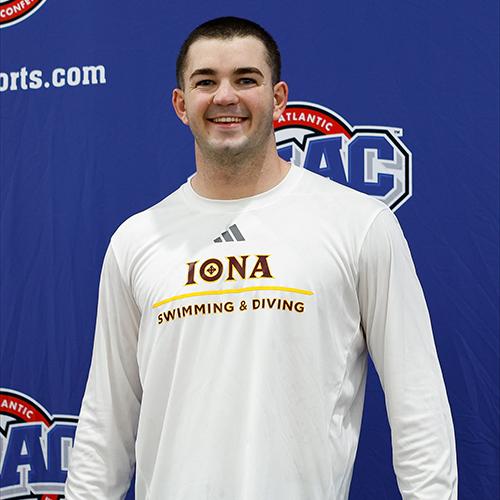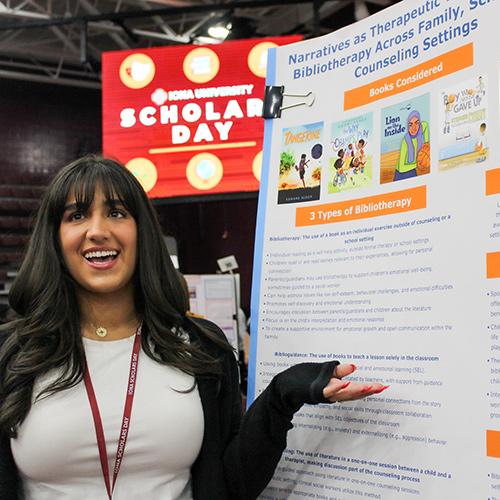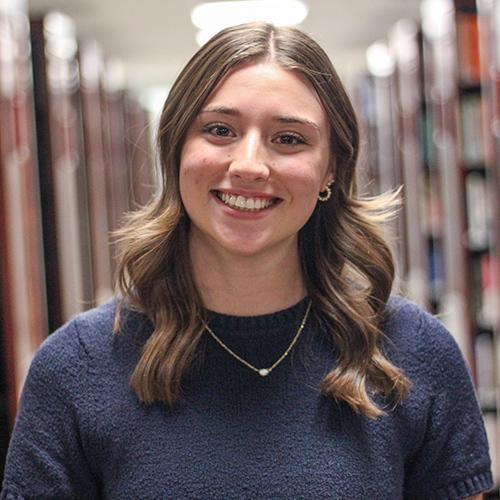Faculty Resources
The community-engaged pedagogy of service-learning is an integral teaching strategy aligned with the mission of Iona University and an Edmund Rice Christian Brothers education. Service-learning can take place in any department, major or class as is deemed appropriate by individual faculty members in collaboration with the community partnerships coordinator for service-learning and with the approval of the associate vice provost.
This page outlines the meaning and benefits of Service-Learning as well as Cocurricular Service-Learning.
If you would like to schedule an appointment to discuss a service-learning course option please contact Kevin M. Griffith, CFC, '83 at kgriffith@iona.edu.
What is Service-Learning?
Service-Learning is a faculty-led academic experience for students. The components of a Service-Learning Course include:
- Academic Content: Teaching the academic content of the course while developing skills that can be applied to student learnings outside of the classroom
- Community Need: Enter into a reciprocal relationship with a community partner (local, national or international) that incorporates what is learned in the classroom with community-based service projects/activities for Iona Students
- Intentional Reflection: Participate in reflective experiences that facilitate deep critical thinking, academic learning, engaged citizenship and social justice.
In a service-learning course, students acquire knowledge and develop skills based on academically rigorous content through scholarly literature, faculty lectures, independent research, group activities and a variety of other educative experiences. These knowledge and skill sets are then paired with and applied to what a community partner group (public and nonprofit agencies; civic, charitable, religious and governmental organizations) has identified as a need for the community it serves.
Courses with a service-learning component can be offered in any academic discipline, focus on any applicable academic topic and be facilitated by any faculty member who wishes to explore service-learning.
Community partners are central co-instructors in the educative process. These partners work with Iona and our individual faculty members to design and implement service activities that enable students to apply newly developed knowledge and skill sets in a way that provides meaningful experiential outcomes for all parties.
Service-learning pedagogy emphasizes that community voice, knowledge, and identity play a formative role in defining what service initiatives are implemented. Our intention is that relationships with community partners are “reciprocal.” We commit ourselves to never take more from a community partner than is given, or to give more to that community partner than is learned from the experience.
We believe that all service-based initiatives must honor the values, perspectives, identities, and knowledge sets of community partners. Our community partners identify the need that our faculty and students will partner in serving. It is not the role of the University to decide in isolation what a community needs or how these needs will be met!
Intentional reflection is a cornerstone of service-learning pedagogy. Scholarship on experiential and service-learning pedagogies consistently asserts that students cannot be expected to perform an action (such as service) and subsequently walk away with significant insights. However, when the activity is paired with reflective components, the potential that students experience significant learning is greatly increased.
Every academic service-learning course at Iona University includes a reflection component that seeks to equip learners to move beyond surface level understandings of complex social issues and facilitates deep critical thinking, academic learning, and engaged citizenship. Reflection often manifests itself in written form, but other strategies are encouraged – including large and small group discussion, artistic expressions such as poetry, painting or drawing, and multimedia presentations. Regardless of modality, a service-learning experience is not complete without a reflection component.
Service-Learning Opportunities
- Are open to all faculty and all courses provided they are approved by the Associate Vice Provost
- Can be in-person/on-site or virtual
- Can be local, national or international
Service-Learning Partnership Matches
Approved service-learning courses can avail of the following service opportunities if they are a partnership match for the course:
- A partnership with an appropriate community organization
- Study Abroad Trips
- Iona in Mission Trips/Immersions
- Mission & Ministry Service Projects
Service-Learning Is Not
- A volunteer program
- Community service hours
- Service through the Office of Mission & Ministry, the Study Abroad Office or Iona in Mission trips/immersions without formally approved Service-Learning designation
- Any service that is not connected to a formally approved Service-Learning course
For a more detailed document on service-learning, please contact Kevin M. Griffith, CFC, '83 at kgriffith@iona.edu.
Cocurricular Service-Learning
Cocurricular Service-Learning (CoSL) engages students in activities outside the formal curriculum that address human and community needs together with structured opportunities for reflection.
CoSL resonates with the founding principles of Blessed Edmund Rice’s approach to education as a means of standing in solidarity with those marginalized by poverty and injustice: Presence, Compassion & Liberation.
CoSL honors the tradition of St. Columba who erected a Church and monastery on the Isle of Iona. From Iona, he promoted the cornerstones of his teachings: Faith, Scholarship & Service.
What Is Cocurricular Service-Learning?
Iona University offers a variety of service opportunities for students to volunteer their time with local, national and international community partners. Many of these opportunities are sponsored by the Office of Mission & Ministry through its highly successful Iona in Mission program and/or its tremendous efforts at community outreach.
These immersions and community service projects can be designated as Cocurricular Service-Learning opportunities provided they meet one of these criteria:
- The service is sustained over the course of an entire semester, or
- The service is sustained over the course of an extended immersion experience.
In both instances, the service must include a built-in mechanism for reflection and deep critical thinking.
Cocurricular Service-Learning – Student Benefits
- Students who participate in a CoSL project or program can attach their CoSL certificate to their résumé.
- A CoSL certificate that is attached to a résumé is attractive to potential employers.
- CoSL helps move students from providing volunteer services for others to becoming advocates for real change in society.
- Engagement in CoSL benefits students in the areas of personal growth and interpersonal development.
Experienced Faculty
Experienced service-learning faculty members who can share their experiences with you include:
- Bret Sanner, Ph.D., LaPenta School of Business
- Tyrone Pope, Ed.D., Criminal Justice
- Malissa Leipold, Ed.D., Columba Cornerstone
- Sharon Kimberly Williams, D.Litt, Religious Studies
- Catherine Smith, Ph.D., Columba Cornerstone
- Lendynette Pacheco-Jorge, MS, Hynes Institute for Entrepreneurship and Innovation
- Christina Orozco Nevers, Ph.D., ATC, NY Presbyterian Iona School of Health Sciences
- Jim Robinson, Ph.D., Religious Studies
- Meryl Nadel, MSW, DSW, Columba Cornerstone
- Aaron Marks, DHSc, LaPenta School of Business
- William Myers, M.Div., Religious Studies
- Melissa Scotti Alvarado MS, OTR/L, Occupational Therapy
- Alice DeLuise Massa, MS, OTR/L, Occupational Therapy
- Rob Kissner, MBA, Hynes Institute for Entrepreneurship and Innovation
Faculty Service-Learning Reflections
“I have found that service-learning has benefited my students immensely, by enabling them to embody the ideas that we have encountered and discussed throughout the semester. Service-Learning empowers students to bridge the gap between theory and practice, to connect with concrete communities, and to link their lives with larger movements for sustainability and social justice."
“I started using service-learning as a teaching strategy because the most transformative class I had as an undergraduate was a service-learning class. I wanted to try to give my students a similarly transformative experience.
I have found that service-learning has benefited my students by giving them experiences and skills employers want. By creating value for real organizations that give them autonomy to use their impressive intelligence and grit, students are able to have experiences where they are doing the sort of work future employers will pay them to do thereby developing the skills employers want.
If a faculty new to the pedagogy were to ask me if they should consider using service-learning, I would say ‘go for it!’ Service-learning is an application of the experiential process that allows you to prove to your students that what you are teaching them in the classroom works outside of it while also creating memories that will last them a lifetime.
I think my teaching has benefited by incorporating service-learning because it motivates students to learn what I am teaching in the classroom for a goal that is bigger than getting a good grade – making the world a better place."
“I started using service-learning as a teaching strategy once I realized that the Iona students con-nected to the Office of Mission and Ministry were having a much more transformational learning experience than other students. Also, service learning is aligned with my personal values and my faculty colleagues Jim Robinson and Liam Myer who are having great success with their service-learning courses. For these reasons, I was open to experimenting with this pedagogical method in my courses.
I have found that service-learning has benefited my students by helping them connect to their spiritual value, spiritual goals, and spiritual purpose through the foundational principle of faith in action. The discoveries students make while volunteering their time promote the values of civil engagement and community involvement. Service-learning creates the path to altruism. Earlier this semester I had a spirituality student express that she wanted to serve in the Peace Corps.
The service-learning project I am most proud of is Immersion Jamaica. As the Director of Peace and Justice Studies at Iona, I speak about our duty to eliminating health disparities around the globe. I lecture and show images and videos that reflect the lack of quality health care in devel-oping nations. But to take students to Jamaica to feed and care for children with cerebral palsy and HIV is the deepest learning experience.
If a faculty new to the pedagogy were to ask me if they should consider using service-learning, I would say it is the perfect pedagogical model for students interested in service careers or public service careers (social work, ministry, health services, human services, psychology and social en-trepreneurship). Service-learning provides meaning for young people in a world where many are lost or floundering and helps them to find their way.
I think my teaching has benefited by incorporating service-learning into my courses because it pushes me to engage in praxis as I begin to move beyond theorizing and academic discourse about spirituality and social activism.”


